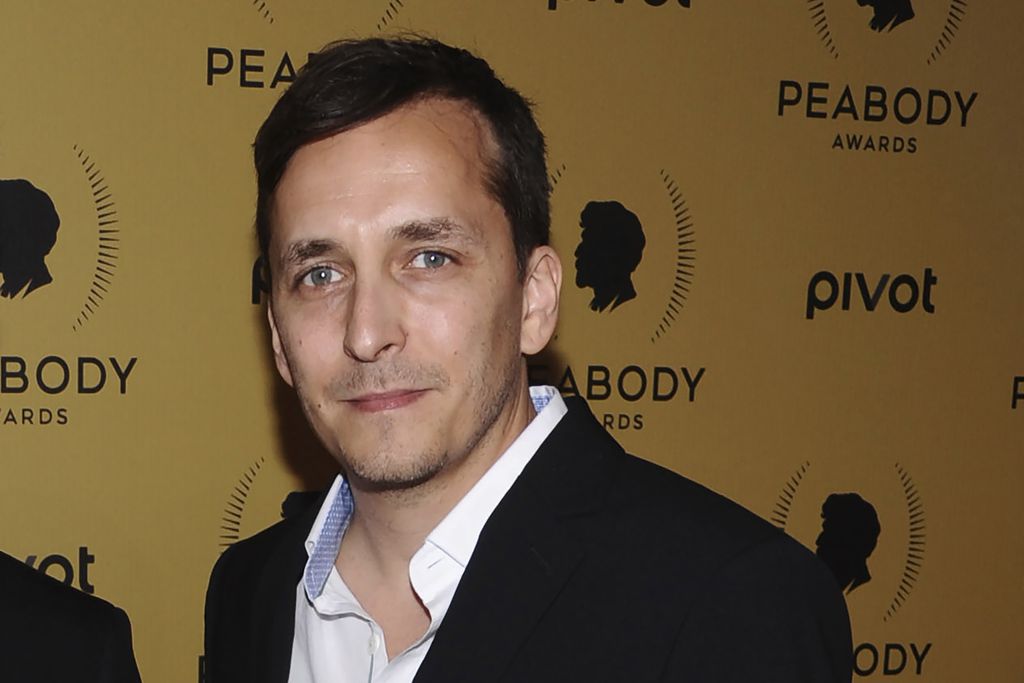We take time out of our typical blog cycle this week to recognize, and mourn, what we must assume is the first, but not last, death of an American journalist in Russia’s attack on Ukraine.
We are saddened and horrified by what is happening to journalists as they work around the clock on what is one of the most important events of the century. As of today, here is the latest on the way in which journalism and their faithful soldiers are in dire jeopardy.
Brent Renaud attends the 74th Annual Peabody Awards at Cipriani Wall Street on May 31, 2015, in New York. CHARLES SYKES/CHARLES SYKES/INVISION/AP [via The Boston Globe]
Reporters on the ground inside Ukraine are in deadly risk. The Committee to Protect Journalists (CJP) and media outlets around the world are condemning the death of American journalist Brent Renaud on Sunday. Ukraine police say Russian forces shot and killed Renaud and wounded his photographer, while the pair was working on a documentary for TIME Magazine. According to Reporters without Borders several media crews have come under fire and at least four other reporters have suffered gunshot wounds since the start of the Russian invasion of Ukraine.
Russian leader Vladimir Putin has outdone even Joseph Stalin in efforts to keep information from getting both out of, and into, Russia. Under a Russian law Putin signed on March 4, journalists (even foreign ones) can be imprisoned for up to 15 years for what Russian officials deem is disseminating false information. The Russian media regulator has blocked more than 20 news websites as well as Twitter, Facebook, and most recently Instagram. Meanwhile, official Russian outlets are attempting to rebrand the invasion to their citizens as a “special military operation” that is being done to liberate Ukraine from a neo-Nazi run government. Mother Jones reported that at the start of the invasion a Kremlin memo urged Russian news outlets to broadcast clips of Fox News host Tucker Carlson criticizing the U.S. and NATO. Reports of Russian propaganda being disseminated on social media are on the rise; one disinformation monitoring platform called Cyabra is reporting that they have tracked more than 115,000 Twitter and Facebook accounts it alleges are spreading Russian propaganda.
The biggest impact of the new law has been the shutting down or blocking of almost 30 independent Russian news outlets such as TV Rain and the radio station Echo of Moscow, which has been operating for 32 years. Novaya Gazeta, whose editor Dmitry Muratov recently won the Nobel Peace Prize, is still operating while trying to walk the tightrope of the regulations. One of their journalists told VOA, “The latest issue we published has been the hardest one to put together, both technically and morally.” Russia’s edict has forced international outlets to make some difficult decisions as well. The New York Times made the unprecedented move to pull its entire bureau. Bloomberg , CBC and others have suspended their operations. TV networks including CNN, ABC and CBS have stopped broadcasting in Russia.
However, there are some signs that journalism is finding a way. We applaud the bravery of the Russian TV station employee who was arrested after interrupting Russia’s main newscast by holding up a sign behind the anchor saying “No War” and urging viewers not to believe the propaganda. According to the Washington Post, exiled Russian journalists are setting up shop in places like Lithuania, Latvia, and Georgia. A Russian language news service based in Latvia called Meduza is using email and a smartphone app to get their messages out and has joined other outlets maintaining channels on the communications app Telegram. The Russian language version of the BBC resumed a shortwave radio service last used during the Cold War. One man in Ukraine started a website called “Papa, Believe Me” (#papabelieve) because his Russian father refused to believe his son’s home was being bombed by Russian airplanes. On the site he is urging people in Ukraine to call their relatives in Russia saying, “They have been lied to for 20 years. Help them.”
Funding campaigns for journalists are getting strong support. European based media watchdog The Fix, Media Development Foundation, and others started a GoFundMe campaign in support of Ukraine’s media sector that has raised $2.5 million to support overall Ukrainian media and $1.5 million for Kyiv Independent. According to Nieman Lab, the money is being used for information technology, protective gear, water filtration bottles and other supplies. People who want to donate can click here.
The situation in Ukraine is yet another reminder of how much we should cherish the right to a free press. UNESCO’s ‘World Trends in Freedom of Expression and Media Development: Global report’ listed the industry’s three greatest challenges as preserving the safety of journalists, protecting press freedom and ensuring the economic viability of journalism. We must keep track of and fight efforts to curtail press freedoms both at home and abroad, keep a watchful eye out for attempts to spread propaganda, and support journalists by buying subscriptions to favorite media outlets, especially local ones. Anything we can do helps.


